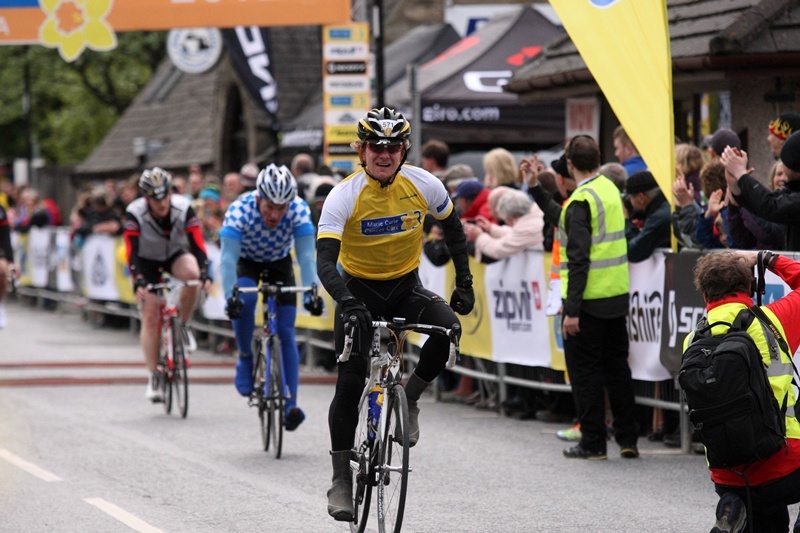A week ago, The Courier’s motoring editor Jack McKeown was preparing to swap four wheels for two and take part in the Etape Caledonia. Two punctures and 81 miles later, here’s his story.
Well, that wasn’t easy. I’m sat in the Courier office about two hours after I crossed the Etape Caledonia finish line on the most cushioned chair I could find.
It all started out painlessly enough. Being a journalist you do get mollycoddled I like it so the organisers put me in the first, fastest wave of riders so I wouldn’t have to wait an hour to start with the rest of the slowbies.
My trademark combination of punctuality and total situational awareness meant I somehow ended up muddled in with the next fastest group instead of the one I was supposed to be in. However, this still put them several orders of magnitude ahead of me in terms of ability.
For the first hour, everyone overtook me. Men overtook me. Women overtook me. Thin people overtook me. Fat people overtook me. The sick and the lame overtook me, or so it felt.
But then, slowly, I began to find my level. I overtook someone going up a hill. Then a few someones.
While I’m OK at going up hills, I’m as cowardly as they come on the descents and they all flew past me again as I feathered the brakes like a sissy.
The first hour was cloudy but otherwise calm. Then all hell broke loose. The Met Office had issued a wet weather warning and they weren’t wrong.
But rain wasn’t the problem: a 40mph wind kicked up and kept changing direction, first pushing against your front, then sending you sideways. The only direction it never seemed to come from was behind.
Through my rain-blurred sunglasses (worn for wind protection, I might add) Loch Rannoch hove into view, looking more like a storm-tossed sea than a loch.
It was the worst weather in the Etape’s five-year history and even the winner’s time was well down on last year.
On the far side of Loch Rannoch I had my first puncture. Fortunately, it happened next to the home of Jane and Adrian Hawker. The bike fanatics paused cheering on the field, grabbed my bike and set to it with a puncture repair kit. In the meantime, they ushered me inside and put a cup of tea and a bacon roll in my hand. Amazing, wonderful people.
Continued…
The repair only held for a few miles, though, and this time it fell to a French member of the technical staff who stopped on his motorcycle. Working with the efficiency of a Formula One pit team, he had a new inner tube and tyre on before I knew what was happening. I later found out these are the same guys who do the Tour de France.
It’s not just the technical guys who are good the whole event is amazingly well organised. There are marshals at every turn-off and track to make sure you don’t take a wrong turn.
And despite having to stand in abysmal weather for five hours, virtually all of them still found time to clap, cheer and encourage each and every rider who passed.
Riders have to maintain an average of 13mph if they want to race on closed roads: fall behind the sweep car and you can still finish the race, but you might have to contend with the odd bit of traffic.
Some time between the painful magnificence of the Schiehallion climb and the 60-mile feed station, the sweep car swept past me. I wasn’t fazed, though: it was my first attempt at a long-distance cycle and my goal was just to complete the course.
One of the Etape’s sponsors, bike-making firm Scott, loaned me a high-end road bike for the race, while Skinny Tyres owner Scot Tares took me on a couple of training rides and helped familiarise me with the course. Their help was invaluable but it was still the toughest physical challenge I’ve ever undertaken.
The event raised over £150,000 for Marie Curie Cancer Care, with more still coming in. And it put millions into the local economy.
What impressed me was the incredible level of support given to the event by locals. At nearly every house along the way families stood in their gardens waving and cheering as cyclists hurtled by. Their support made a real difference.
I crossed the finish line as exhausted as I can ever remember being. My back, shoulders and legs ached. And the pain in my undercarriage does not bear describing. But I’d accomplished something I didn’t know if I could, and that’s a good feeling.
And my time? Seven hours 20 minutes a shamefully slow pace.
But somehow, I’m quite proud of it. And I’ll beat it next year…
